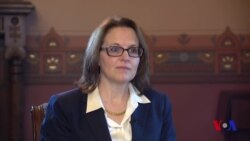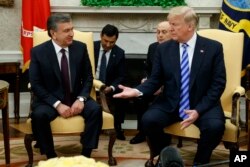Lisa Curtis, Deputy Assistant to President Trump and Senior Director on South and Central Asia at the National Security Council in the White House, discusses the factors behind the new strategic partnership with Uzbekistan, which leader just visited Washington. Curtis talked to VOA's Navbahor Imamova.
National Security Council, White House, May 18, 2018
Navbahor Imamova, VOA Uzbek: Thank you so much for being available to talk to us.
Lisa Curtis, NSC, White House: Absolutely, it's great to be here.
Navbahor Imamova, VOA Uzbek: It's been a very intense week when it comes to U.S.-Uzbek relations. How satisfied are you with the visit of President Mirziyoyev?
Lisa Curtis, NSC, White House: I think the visit went very well. I think the two leaders connected and I think they had a wonderful discussion, a one on one discussion and then a larger discussion with the rest of the cabinet members, so it was very wide ranging. They talked about a whole host of issues, whether it was Afghanistan, or military to military cooperation, or economic and business cooperation, human rights reform, they really covered the gambit of issues.
I think the two leaders connected...
Navbahor Imamova, VOA Uzbek: When we heard from President Trump in the Oval Office, he emphasized on the military cooperation, which raised many questions... As you know, many human rights organizations called, as a group and separately too, to raise critical issues. How much time was spent on discussing human rights?
Lisa Curtis, NSC, White House: Well, the human rights issues definitely came up in the broader discussion, where you had the cabinet numbers and about 15, 20 people in the room. And certainly human rights issued did come up. As you know, Ambassador Brownback, the Ambassador-at-Large for international religious freedom, was specifically invited to the lunch so that these issues would be raised and they certainly were.
And as you know President Mirziyoyev was able to talk about some of the positive movement on the human rights front. The release of political prisoners, the efforts to eliminate child labor and the opening of the media. As you yourself know, with VOA receiving accreditation, this has really opened up opportunities for U.S. media, and facilitating a more open media environment. So he certainly had a good story to tell in terms of the progress that Uzbekistan has made. But on the U.S. side there were continuing questions, particularly on the religious freedom issue. And we're hopeful that we'll see Uzbekistan move forward on the religious freedom issue as well.
Of course, Uzbekistan provided a road map for how they plan to move forward on these issues, so that was a major topic of discussion during the broader meeting.
... the religious freedom issue is definitely a challenging issue for Uzbekistan.
Navbahor Imamova, VOA Uzbek: Well, what we heard from the Uzbek delegation and also from President Mirziyoyev himself was that he was here to also discuss challenges, that reforms are difficult and that this is a very challenging time for Uzbekistan. What kind of challenges did they talk about with you?
Lisa Curtis, NSC, White House: Well, as I mentioned, the religious freedom issue is definitely a challenging issue for Uzbekistan. And as you know they're considered a country of particular concern, according to our State Department international Religious Freedom Report. So that is a definite challenge that we're hoping to see progress on in the coming months.
I think he talked about how far Uzbekistan has come. He's been there 18 months, so he has pushed forward with as many reforms as he could in the time that he has had. But of course these things take time, change takes time. So this was an important issue of conversation but also, as you mentioned, the Afghanistan building up military to military cooperation. That's also something that President Trump has expressed interest in.
Navbahor Imamova, VOA Uzbek: We saw President Mirziyoyev at the Department of Defense yesterday morning, and the day before U.S. and Uzbekistan announced joint statement on strategic partnership agreement. Where does the agreement stand? We know that they have not signed the agreement yet.
Lisa Curtis, NSC, White House: Well, I think the idea was to build a new era of strategic partnership. We had a strategic partnership agreement 16 years ago, so we had ups and downs in the relationship since then. So I think this visit really marks a new era in that strategic partnership. And as you said there was no specific agreement signed as such, but I think the joint statement itself is a very powerful message about where both sides want to take the relationship moving forward. And the commitment by both sides to make sure that we have greater cooperation across a broad range of sectors.
... we have to see this level playing field created for U.S. businesses.
And we had a lot of expressions of U.S. business interest. But I think during the meetings it was made clear that the U.S. needs to see a level playing field in Uzbekistan, and whereas we seen in the beginning of some economic reforms there's still work to be done on intellectual property rights, and making sure that you have that level playing field for all companies. So that they will have confidence in the rule of law and the sanctity of contracts. So I think as we move forward and we see those economic reforms that President Mirziyoyev has committed to, he's committed to bringing in international business, and he is very interested in attracting U.S. investment. But in order to see that actually happen we have to see this level playing field created for U.S. businesses.
Navbahor Imamova, VOA Uzbek: What are the conditions for the military operation? We know that Uzbekistan is going to increase its participation in the Northern Distribution Network and they have several years of experience in doing that, but what are some of the conditions that you're putting forward to make sure that they follow so that then you can provide the kind of military assistance they want? Because they do want military assistance.
Lisa Curtis, NSC, White House: Well, of course, any military to military cooperation that we would engage in would be based on following human rights norms and this would be the basis of the cooperation. But I think what we're looking for is building a foundation where we better understand each other's systems and we can find ways to operate together. So there are a lot of basic agreements that have to be discussed and put into place. So I think that's where we are in terms of military to military cooperation.
We know that there is some red tape also on the U.S. side and I think President Trump was very clear that he would like to see the U.S. side clear some of those bureaucratic hurdles. So that we could have more defense cooperation, defense trade in Uzbekistan.
... any military to military cooperation that we would engage in would be based on following human rights norms and this would be the basis of the cooperation.
Navbahor Imamova, VOA Uzbek: Congress will have to approve all of this, right?
Lisa Curtis, NSC, White House: Exactly, yes so I think both sides have work to do to really bring that military to military cooperation up to the potential that we have. And of course there's a great need for Uzbekistan in terms of border security. They don't have a long border with Afghanistan but they still need to protect that border, and so we would like to help them with that.
In terms of the security cooperation we would also like to have more cooperation in countering terrorism. There you get into some of the law enforcement agreements that we're seeking and to make sure that we have in place the mechanisms to be able to deal with the terrorism issues that affect both of our countries.
Navbahor Imamova, VOA Uzbek: You said that President Trump and Mirziyoyev connected. What would it take for the U.S. president to travel to Central Asia? As you know, no U.S. president has ever been to the region and at times like this a lot of people get very excited and they wonder when will the American leader come to Central Asia? We hear again and again that the region matters.
It's no secret that this is a region that has been dominated by Russia. Increasingly being looked at by China, in terms of economics investments, Belt and Road initiative. So the U.S. wants to have a presence...
Lisa Curtis, NSC, White House: Well, I think you're right that this administration sees the importance of Central Asia. We've had the visit of President Nazarbayev in January, now the president of Uzbekistan. So clearly there is an interest in the region and I think this administration sees the opportunities that are there. There are emerging markets. There's really a hunger to have more U.S. investment in the region. And there are changes happening. We see this most prominently in Uzbekistan where we just talked about, the reforms that are happening under the leadership of President Mirziyoyev. And of course, Afghanistan, we have seen the importance of Afghanistan being connected with the Central Asia region so that is also a motivating factor.
It's no secret that this is a region that has been dominated by Russia. Increasingly being looked at by China, in terms of economics investments, Belt and Road initiative. So the U.S. wants to have a presence, wants to be engaged with this region that's really at the heart of Eurasia. So while I can't comment on the President's schedule moving forward, I think I can say with confidence that this administration does place a great deal of importance on Central Asia.
Navbahor Imamova, VOA Uzbek: Thank you so much.
Lisa Curtis, NSC, White House: Thank you!








Facebook Forum